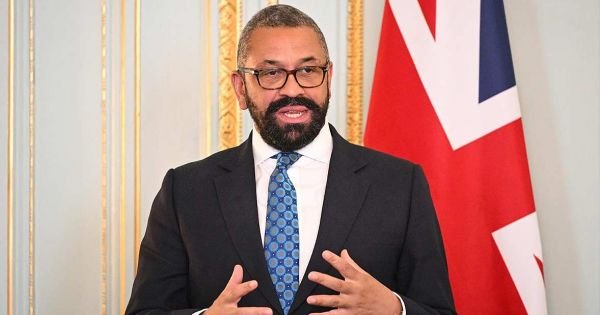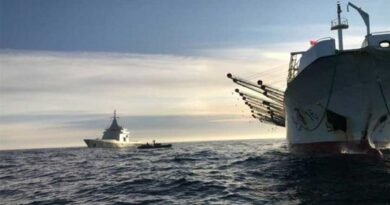Argentina’s Falklands claim at CELAC/EU summit, a midwinter dream
[ad_1]
Argentina’s Falklands claim at CELAC/EU summit, a midwinter dream
Foreign Secretary James Cleverly said people of the Falklands have chosen to be British, belong to the British family and have the right to self determination, enshrined in the UN Charter
The Argentine government’s victory cheering and bragging about a joint declaration from two continents on the Falklands/Malvinas issue has turned out to be a brief midwinter dream. This was strongly confirmed by the British Foreign Office and the European Union.
It all started this week in Brussels, when Latin American and Caribbean nations leaders under the umbrella of CELAC, Community of Latin American and Caribbean Nations, were hosted by the European Union and among other divisive points in a bilateral agenda including the Russian/Ukrainian war, trade and investments, Argentine diplomacy managed to introduce clause 13, referred to basically the country’s long standing claim over the Islands sovereignty.
The controversial article 13 read something like, As to sovereignty of the Falkland/Malvinas Islands, the European Union has taken note of Celac’s historic position, based in the significance of dialogue and respect for international Law for the peaceful solution of controversies. Adding we reaffirm our fundamental adherence to all objectives and principles of the United Nations Charter, particularly sovereignty equality of all States and respect of its territorial integrity and political independence, as well as the solution through peaceful means and in abidance of the principles of Justice and International Law,.
The statement although, in the final joint declaration of the Brussels summit was not unanimous since Nicaragua, a staunch supporter of Russia in the Ukrainian conflict, rejected some of the wording (territorial integrity), it understood offensive for Moscow. Nicaragua and dictator Daniel Ortega are very close friends of the Argentine and Venezuelan governments.
This however, particularly Article 13, and Argentina’s interpretation, did not prevent the Alberto Fernandez/Cristina Kirchner government from celebrating that it was the first time the EU, now without UK (because of Brexit) referred to the conflicting situation and sovereignty disputes in the Falklands, was short lived.
In effect, the British government was quick and firm in underlining the Falkland Islanders right to self determination, and to decide on their future, which was cemented with the March 2013 referendum when an overwhelming majority of Islanders opted for the Falklands to continue as a British Overseas Territory, and full member of the British family.
The Falkland Islands have clearly stated their wish to continue being British and its only up to them to decide on their future, Foreign Office sources indicated in London, according to quotes in the Argentine media.
This is a position supported by International Law and the United Nations Charter, which is extensive to all UN members. We will continue to defend the right of the Falkland Islands to self determination in all international forae. All countries should recognize the Islanders right to decide on their own future.
But that was not the only surprise for Argentine enthusiasm and alleged ‘historic’ diplomatic triumph, a few hours later the European Commission spokesperson for foreign affairs, Peter Stano, bluntly informed that the European Union has not changed its position regarding the Falkland Islands.
Member states of the EU have not changed their points of view and positions regarding the Falkland/Malvinas Islands issue. The EU is not in conditions to express any position on the Falklands/Malvinas since there is no debate in the Council agenda on this issue, according to spokesperson Stano.
”The EU does not take any position on such matters without a clear mandate from the Council, (a decision from the 27 EU members at the Council).” In effect the EU has taken notice of the (Brussels) summit position.
EU will always be willing to listen to the positions of our partners and take notice of those positions. In that spirit the EU has taken notice of the interest shown by Argentina and CELAC member states in addressing the Falklands/Malvinas issue.
On Wednesday, a source close to Foreign Secretary Jeremy Cleverly insisted that the people of the Falklands have chosen to be British, belong to the British family and have the right to self determination, enshrined in the UN Charter.
A Cleverly spokesperson was quoted saying to the Financial Times, The Argentine government can pressure all it wants, but this does not change the fact that the Falkland Islands are British. That was the clear will of the Falklands people ten years ago, when 99,8% of Islanders voted to continue being part of the British Family. Our commitment with that decision is unwavering and will continue to be.
From Buenos Aires, Malvinas, Antarctica and South Atlantic Islands secretary Guillermo Carmona again pointed out to the fact that the Malvinas question is included in two of the 41 points of the Brussels joint declaration, a document with the signatures of the European Council president, Charles Michel and of the European Commission, Ursula von der Leyen.
Carmona said that until 2021, the EU considered the Malvinas, South Georgia and South Sandwich Islands as Overseas Territories from the EU, and even after Brexit, there was a reluctance from the EU to mention the Malvinas sovereignty dispute in the Malvinas Question.
Now however after Brussels, the EU acknowledges there is a sovereignty dispute between Argentina and the UK over the Malvinas Islands, and that this dispute must be solved in accordance with international law, which has always been Argentina’s position”
[ad_2]
Source link




